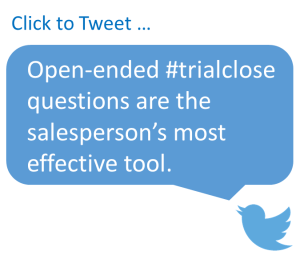 Studies by sales organizations have consistently identified the two most difficult selling skills:
Studies by sales organizations have consistently identified the two most difficult selling skills:
- Asking good, profound questions, and listening intently and actively to buyers
- Knowing when to ask for the sale, and then actually asking for it
Our research shows that buyers want to explain their gain opportunities and pain points, and that salespeople should only be talking 30% of the time – the rest of the time they should be listening intently to what they buyer is saying. Moreover, our research finds that buyers value listening skills, asking good questions, and being a good problem solver as the traits buyers seek from salespeople.
On the flip side, what do companies value most in their salespeople? Making sales! And to be an effective salesperson, you have to ask for the sale. Studies show that nearly half of sales calls end without an attempt to close the sale. In addition, another study found that the national sales closing rate is only about 27%.
So, how does a salesperson “bridge the gap” between just being a good listener and making the sale? This article will “bridge that gap” and is focused on two things: 1) how to ask your buyer questions to know when to ask for the sale, and 2) how to ask for the sale.
Is your buyer ready to be asked for the sale? - Ask an open-ended trial closing questions.
Sales conversations can be long or short – they can be straightforward or complicated. You might ask lots of good open ended questions, and if you are good you will be listening well to understand how you can help your buyer achieve his objectives. The most effective way to know when to ask for the sale is by asking “trial closing” questions.
Trial closing questions are open-ended questions meant to determine if you are making progress with your buyer and what objections your buyer has to your recommendations. Think about this situation - You’re in a sales conversation and you’ve been finding out how you can help your buyer meet his objectives. You’ve made some preliminary suggestions and you are interested to know if you are making progress in the sales process. This is the time to ask the open-ended trial closing question. You might ask one of the following questions
- How do you feel about that?
- What are your thoughts at this point?
- What do you think?
[For more information about trial closing, read Trial Closings – The Key to a 100% Close Rate.]
Open-ended trial closing questions let you know how you're doing.
These open-ended trial closing questions are meant to elicit a response that tells you how you are doing. Is your buyer buying into your recommendations? Are you and your buyer seeing eye-to-eye? Does your buyer appear interested in the direction you are taking? If your answers are “yes”, then you are making progress toward the sale. If the buyer responds with some kind of objection, then you know how you need to either shift the conversation to something more appealing to the buyer or you have to overcome that objection. In all cases, you know what you are dealing with and you know your next step.
Open-ended trial closing questions are the salesperson’s most effective tool because the answers help you chart a course for the rest of the sales conversation and they tell if when the time is right to ask for the sale.
Asking for the sale - A respectful closed-ended question
You’ve asked open-ended trial closing questions throughout your sales conversation. You’ve overcome all objections. The buyer seems to agree that your recommendations can support achieving his objectives. Everything you are seeing and hearing from your customer says “he’s ready to buy”. It’s time to ask for the sale.
Sales training programs suggest all kinds of ways to ask for the sale from the “assumptive close” to the “puppy dog close”. Personally, I don’t like to play games and manipulate anyone, especially someone with which I’m interested in doing business. So I suggest an approach that is more straightforward.
When asking for the sale, most of the time you will ask a closed-ended question because you are seeking a “yes” or “no” answer – hopefully a “yes” one. In other cases your question may not be a “yes or no” question but one in which you give choices. As such, here are some good questions when asking for the sale
- Which of these 3 options would you like to go with?
- Based on our schedule, we can get started next week. Would you like us to schedule it?
- Would you prefer the lease or purchase option?
- If I can meet that time frame, would you like to get things started?
- We’re confident we can achieve your objectives. Would you like to get started?
Few, if any, salespeople would be uncomfortable, disrespectful or feeling like a “snake oil salesman” by asking for the sale using any of these questions.
[Read Closing the Sale – The Signals to Look For to find out when to best time that final question.]
In summary ...
Ask open-ended trial closing questions to make sure you are connecting with your buyer and to determine when the buyer is ready for you to ask for the sale. Listen intently and overcome any objections. Use closed-ended or choice-type questions when you ask for the sale.
[Check out The 4 best selling skills I’ve ever paid to learn for more selling words of wisdom.]
To start a dialogue about about advanced sales tactics and strategies for your business, contact WebStrategies, Inc. online or by phone at 804-200-4545.






Agree, disagree, or just have something to add?
Leave a comment below.